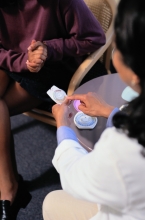Women who experience recent intimate partner violence (IPV) are three times more likely to contract HIV, according to a new study led by McGill University researchers. In regions like Sub-Saharan Africa, women face an intersecting epidemic of intimate partner violence and HIV.
“Worldwide, more than one in four women experience intimate partner violence in their lifetime," says McGill University Professor Mathieu Maheu-Giroux, a Canada Research Chair in Population Health Modeling.



